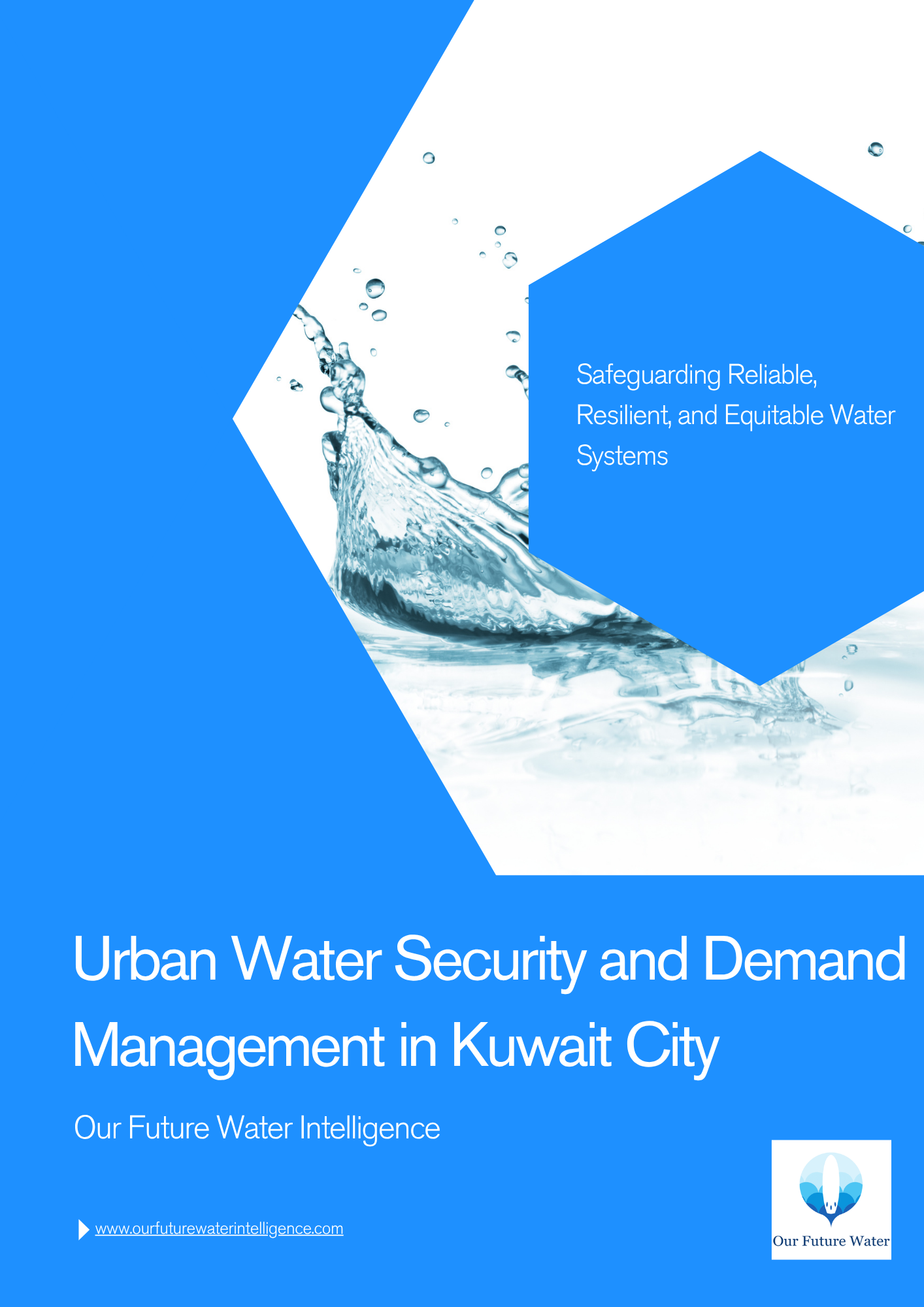
Urban Water Security and Demand Management in Kuwait City
Urban Water Security and Demand Management in Kuwait City
Strategic framework for hyper‑arid urban water security, subsidy-constrained demand management, and reclaimed water expansion in Kuwait City.
Target Audience
- Utility Executives: Benchmarking smart metering rollouts, NRW reduction in highly subsidised systems, and large-scale wastewater reuse centred on the Sulaibiya plant.
- Regulators: Assessing tariff structures, subsidy trajectories, and block-tariff reform options under Kuwait Vision 2035 and the National Adaptation Plan.
- Infrastructure Investors: Evaluating desalination PPPs such as Al‑Khiran Phase I, wastewater storage expansion, and stormwater capture systems for long-term resilience and circular water value creation.
Report Deliverables
- System-level mapping of Kuwait City’s desalination, brackish groundwater, and reclaimed water portfolio against present and projected urban demand.
- Quantified analysis of subsidy costs, smart meter business case (KWD 13.2 million annual savings), NRW drivers, and the economics of reclaimed water versus desalination.
- Scenario-based roadmap for scaling demand management, wastewater reuse, greywater and stormwater capture, and behavioural interventions within a politically sensitive pricing environment.
The Five Strategic Pillars
Operational Excellence & Resilience
Kuwait City offers a high-intensity test bed for desalination-led urban systems where natural recharge is negligible, evaporation exceeds 3,000 millimetres per year, and the water stress index reaches about 3,850. Installed desalination capacity of 682.8 MIGD in 2022, supplemented by 545,000 cubic metres per day of brackish groundwater extraction and expanding reclaimed water storage to 680,000 cubic metres per day, has secured uninterrupted potable supply and high service quality, placing Kuwait among global leaders in water and sanitation access.
At the same time, per capita freshwater use of 447 litres per person per day in 2023, a 5.7 percent year‑on‑year increase in total freshwater consumption to roughly 847.7 million cubic metres, and projected maximum daily demand of 3.64 million cubic metres (800 MIGD) by 2035 highlight the urgency of demand management. Without reform, annual household water subsidies are expected to approach USD 2 billion by 2050 and desalination-related emissions could exceed 15 million tonnes of CO₂ per year, underscoring the need to pair supply security with aggressive efficiency, reuse, and behavioural measures.
Estimated yearly cost of freshwater provision today, with forward projections indicating household subsidies nearing USD 1.99 billion and desalination-related emissions reaching about 15.54 million tonnes of CO₂ annually by 2050 if consumption trends persist and subsidy reform remains limited.
Expert Briefing: FAQs
How is Kuwait City’s water transition funded?
Kuwait’s water system is financed predominantly through state-funded desalination and reclamation infrastructure, with tariffs recovering only a small fraction of real costs due to subsidies covering roughly 95 percent of production. Large-scale projects, such as Al‑Khiran Station Phase I and wastewater storage expansion, are increasingly delivered via PPP models to leverage private capital, while the economic case for reclaimed water—costing about USD 0.78 per 1,000 litres compared to USD 3.13 for desalinated water—strengthens the rationale for redirecting investment from pure supply augmentation to lower-cost, lower-emissions reuse.
What defines Kuwait City’s “urban water security” approach?
Kuwait City’s approach blends high‑capacity desalination, brackish groundwater blending, and advanced wastewater reclamation with a historically subsidy‑driven social contract that treats water as a right financed by hydrocarbon revenues. Emerging strategies under Kuwait Vision 2035 and the National Adaptation Plan seek to rebalance this model by expanding non-potable reuse toward a 100 percent target, introducing gradual block-tariff reforms, deploying smart meters at scale, and using greywater and stormwater infrastructure in projects such as South al‑Mutlaa to reduce both fiscal exposure and climate risks.
How does digital intelligence improve performance?
Digital intelligence is anchored in MEWRE’s plan to install 200,000 smart water meters, which will underpin remote reading, near‑real‑time consumption analytics, district metered area benchmarking, and algorithmic leakage detection in a network exceeding 18,000 kilometres with more than 9,400 annual pipe breakages. Combined with 97 percent digital service delivery, GIS-based network mapping, and behaviourally informed billing designs that can provide usage graphs, practical tips, and social comparison information, this digital backbone is expected to deliver annual savings of about KWD 13.2 million, reduce energy use by around 30.5 million kWh, and avoid roughly 16,154 tonnes of CO₂ per year while enabling sustained demand-side behaviour change.
Choose options

ARTICLES

Yorkshire Water Nature First urban drainage and wetlands strategy
Yorkshire Water's Water Utility of the Future programme uses a Nature First commitment, wetlands, blue‑green streets, and digital intelligence to cut storm overflows and build climate resilience ac...
Read more
Yorkshire Water Resource Decoupling and Green Energy Transformation
Yorkshire Water is decoupling service from emissions by targeting 40% renewable self-generation, up to 120 MW of solar and expanded biogas-to-biomethane projects, turning key treatment sites into i...
Read more
Yorkshire Water Adaptive Planning and Non-Stationary Climate Resilience
Yorkshire Water is using adaptive planning, the Yorkshire Grid and targeted redundancy projects to manage a non-stationary climate, strengthen drought and power resilience, and protect customers fr...
Read more